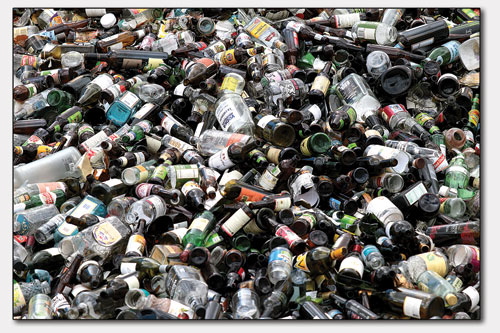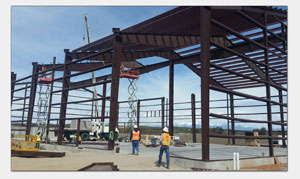
The value of glass as a commodity is at historic lows and the cost to ship it to processing centers on the Front Range is about the same as what recycling businesses can get for it./Photo by Jennaye Derge
Spinning the bottle
Big and small businesses help city fill recycling gap
by Tracy Chamberlin
The Durango Glass ProjectEverything with the project is paperless to avoid adding anything to the trash bin, so invoicing and bills are all electronic transactions. Charges range from $7 for a monthly pick-up to $15 for the weekly service. Bins are also available. |
In 1970, the U.S. celebrated its first Earth Day. It signaled the start of the modern environmental movement, when carbon emissions became cause for concern, green became more than just a color and the recycling bin got its own spot next to the trash can in the kitchen.
These days there’s another receptacle next to those aluminum cans and plastic bottles: one just for glass.
Like a fly in the ointment, glass is the spoiler in single stream recycling. It can’t be processed along with other recyclables and has its own place in the commodities market, where just breaking even is the name of the game.
When Durango first switched over to single stream a couple years ago, the city offered a couple public drop-off spots for the troublesome glass, one behind North City Market and the other behind Wagon Wheel Liquor.
But those bins were instead used like trash cans and everything in them ended up in the landfill. “We were having huge issues with contamination,” explained Levi Lloyd, director of city operations for Durango.
As a result, both drop-off locations were recently closed, leaving the city’s Recycling Center on Highway 160 as the only spot to take glass to be recycled.
Local entrepreneur Christian Tribble didn’t want to see any more of it end up in the landfill, so he decided to do something about it.
|
|
“I heard a lot of people complaining about (the City) taking it away,” Tribble explained. “It just seemed like there was the need for someone to do something, so I thought I’d give it a shot.”
So Tribble started the Durango Glass Project. It’s not a company or big business, but more of a grassroots project. “It’s just me and my pickup truck,” he said.
Tribble offers glass pick-up and drop-off in the Durango area weekly, bi-weekly or monthly for a small fee. The project is only in its second month, but he already has some regulars.
“Glass is a tough one,” said Mark Thompson, owner and founder of Phoenix Recycling.
The value of glass as a commodity is low, he added, and the cost to ship it to processing centers on the Front Range is about the same as what they get for it. Because of that Phoenix can’t process glass. They take it to the city’s Recycling Center just like everyone else.
Glass and other recyclable materials in the single stream program are bought and sold as goods. And, like any other commodity, recycling is affected by changes in the marketplace.
Right now, the price for recyclable material is at historic lows. Lloyd said the top two causes behind it are a dock strike in California and tough economy in China.
About a year ago, dock workers in the Golden State went on strike and recycled materials piled up during negotiations. When everyone went back to work, the market was flooded with the backlog, and the commodity price dropped.
At the same time, the economy tanked in China. As the key player in the recycled materials market, prices fell even further.
With such a dynamic commodity, budgeting is a challenge for city officials. In order to combat those challenges, the city is also looking at rates and participation.
Recycling fees went up slightly this year, and a rate study will take place this summer to determine if those fees can keep their sustainability efforts within budget.
Current participation in the city’s residential recycling program is 80-85 percent, Lloyd said. The biggest spot for growth is with commercial business, where they’re gaining one or two a month.
“I thing businesses want to do the right thing,” Lloyd said. “Recycling is becoming more and more the norm.”
Trucking recyclable materials, in general, is a huge cost for both the city and Phoenix.
Lloyd said Durango’s location is one of the reasons it costs so much to get the material to processing centers elsewhere. It’s also the reason why keeping it here in Durango could be a win-win for everyone.
Life outside the landfillFor Phoenix Recycling, it’s more than just business. They consider themselves a part of the community and believe in giving back. |
Right now, Phoenix is constructing a new facility off County Road 307 near Elmore’s Corner where they would be able to process the recycled material instead of sending it off.
“Everything we do is built around trying to treat all forms of waste as a resource,” Thompson said.
Back in 2012, Thompson got approval from La Plata County to begin creating a Resource Recovery Park, where all types of recycling could find a home. However, shortly after that approval, the landowner backed out.
“We hope this is the first step toward the development of the Resource Recovery Park,” Thompson said.
All of the ideas presented along with the original are still on the table: a sorting facility, composting facility, scrap metal recycling, energy recovery center, reuse business and green business incubator.
“We think of it as a shopping mall,” Thompson explained.
He hopes it can be a place where small, green ideas can take root alongside larger players, working together to serve every niche and need in the community.
The first phase of the park is already under way, with the sorting facility and processing center going up on 5 acres of a 30-acre plot. Construction is set for completion in July, just in time to participate in the city’s competitive bidding process for processing recycled goods. This could keep Durango’s recycling efforts local, the most environmentally friendly and sustainable possibility of all.
“There’s a void in Southwest Colorado we hope to fill,” Thompson said.
In this week's issue...
- December 18, 2025
- Let it snow
Although ski areas across the West have taken a hit, there’s still hope
- December 18, 2025
- Look, but don't take
Lessons in pottery theft – and remorse – from SW Colorado
- December 11, 2025
- Big plans
Whole Foods, 270 apartments could be coming to Durango Mall parcel

